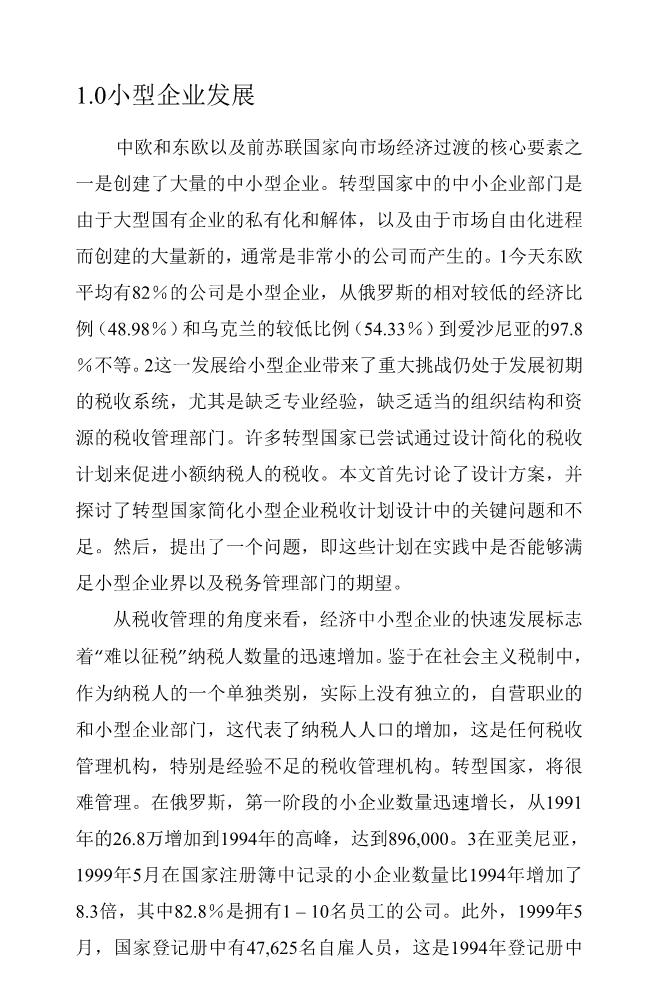Creating a Favorable Tax Environment for Small Business
【美】Michael Engelschalk
International Journal of Entrepreneurship and Small Business,Vol.28,No.2-3,2016
Abstract
The paper first discusses the growth of the SME sector in the region and its impact on tax policy and tax administration. It then describes approaches chosen by different countries in the region to reduce the tax burden and compliance costs for SMEs. The paper looks at policy changes in Georgia, Ukraine, Russia, and Albania and analyzes their motives and impact. In the final section the paper shows that, despite the often very generous tax reductions offered by simplified regimes, these regimes have not significantly altered the tax behavior of SME operators.
Keywords: tax, tax environment, SME, Georgia, Ukraine, Russia, Albania
1.0 Small business development and compliance
One of the core elements of the transition to a market economy in Central and Eastern Europe and the countries of the Former Soviet Union has been the creation of a large number of small and medium size businesses. The SME sector in transition countries emerged as a result of the privatization and breakup of large state-owned enterprises, as well as through a large number of new, generally very small firms that were created as a consequence of the market liberalization process.1 Today on average 82% of firms in Eastern Europe are small businesses, ranging from a relatively low percentage of the economy in Russia (48.98%) and Ukraine (54.33%) to as much as 97.8% in Estonia.2 This development creates major challenges for tax systems that are still in an early stage of development and, in particular, tax administrations that lack both professional experience and a proper organizational structure and resources. Many transition countries have attempted to facilitate the taxation of small taxpayers by designing simplified taxation schemes. This paper first discusses design options and examines the key problems and weaknesses in the design of simplified small business taxation schemes in transition countries. It then raises the question as to whether these schemes in practice have been able to meet the expectations of the small business community as well as the tax administration.
Rapid development of a small business segment in the economy from a tax administration point of view signifies a rapid increase in the number of lsquo;hard-to-taxrsquo; taxpayers. Given that an independent, self-employed and small business sector was virtually non-existent as a separate category of taxpayers in the socialist tax system, this represents an increase in the taxpayer population, which any tax administration, but especially the inexperienced tax administrations in transition countries, would find difficult to manage. In Russia the number of small businesses grew quickly in the first phase of transition, from 268,000 in 1991 to a peak of 896,000 in 1994.3 In Armenia the number of small businesses recorded in the state register in May 1999 had increased 8.3 times compared to 1994, 82.8% of which were firms with 1 – 10 employees. Furthermore, 47,625 self- employed persons were in the state register in May 1999, which is nearly6.8 times the number registered in 1994.4Development of a small business sector was also extremely rapid in Poland, where in only one decade of free markets two million small enterprises were established, and in Hungary, where the rate of self-employed doubled between 1988 and 1993. Even in the later stage of transition, growth in the number of small business taxpayers was remarkable in some transition countries. In Bulgaria for example, the number of enterprises registered by the General Tax Department (GTD) increased by more than 25% within two years, from 573,000 in 1997 to more than 721,000 in 1999. More than 93% of these registered businesses were small taxpayers. None of the tax administrations in the region had any possibility to adapt their capacity to the growing number of taxpayers. Due to the lack of sufficient audit experts, the non- existence of a proper risk analysis capacity to determine priorities for taxpayer control, and the natural emphasis of tax administration reform on assuring the appropriate administration and collection of taxes from large taxpayers, there was very little chance in practice to design and implement a compliance strategy for the small business sector.
The culture inherited from the communist period in many transition countries saw small businesses and general private economic activities as parasitic, hence more as an enemy of the state rather than as source of prosperity and a larger tax base. This perception impeded the development of a cooperative relationship between the small business community and the tax administration. Lack of appropriate compliance management combined with the non-existence of a voluntary compliance tradition facilitated rapid development of the underground economy in many transition countries. Estimations indicate that in several countries in the region a larger share of small business activities is carried out in the underground than in the official economy. The observation in a Hungarian research paper that, “Examining Hungarian data, it appears that some of the innovation in small businesses indeed took the form of tax evasion in informal activities,” is equally valid for other countries in the region. Geuml;rxhani, e.g. estimates that in Albania the average ratio of tax evasion in the self-employed sector of the economy is 56.5%.7A surve
剩余内容已隐藏,支付完成后下载完整资料


英语译文共 36 页,剩余内容已隐藏,支付完成后下载完整资料
资料编号:[255253],资料为PDF文档或Word文档,PDF文档可免费转换为Word


